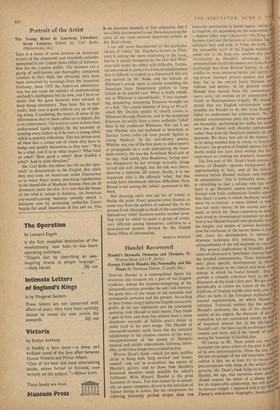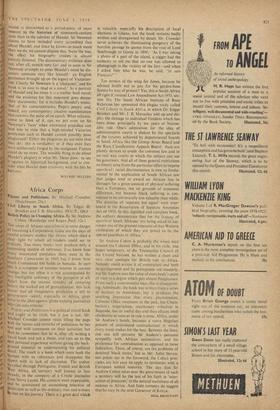Handel Recovered
Handel's Dramatic Oratorios and Masques. By Winton Dean. (0.U.P., £6 6s.) George Frideric Handel, His Personality and His Times, By Newman Flower. (Cassell, 30s.) THOUGH Handel is a cosmopolitan figure his oratorios and masques are a part of the English tradition; indeed the oratorio-mongering of the nineteenth century provides the only link between the great days of our music in the sixteenth and seventeenth centuries and the present. According to their (rather dingy) lights the English mercantile public of the late eighteenth and the nineteenth centuries took Handel to their hearts. They made a god of him; and there has seldom been a more disastrous example of fallible man's desire to make God in his own image. The Handel of nineteenth-century myth bears but the remotest relationship to the creative essence of the man; misapprehension of the nature of Handel's musical and artistic conventions followed inevit- ably, as the false image was accepted as true.
Winton Dean's book—which for once justifies clichd in being both 'long awaited' and `monu- mentar—sets out to re-establish the nature of Handel's genius; and to show how Handel's historical situation made possible his talent's fulfilment. With Mozart, Handel is the great humanist of music. For that reason he is essenti- ally an opera composer, drawn to the imitation of human beings in action. But his compassion for suffering humanity probed deeper than was
normally permissible in heroic opera: which 0... a ritualistic art depending on the assumption II* —despite fallen man's depravity—the King co ;. become God and the heaven of a Golden Age P. achieved here and now, in Time, on earth. TIO ! the mercantile spirit of the English middle-cla! i could not, in the long run, swallow this pro,. i inestimably to Handel's advantage: for 1 i prompted him to take his themes not from cl assia! : mythology but from Biblical history; to see : conflict in more universal terms, not merely as)! l tug-of-war between private passion and publil duty but as the eternal battle between nott/ volition and destiny. In his greatest orator . Handel thus started from the conventions : opera seria, yet created an art comparable Wt Greek or Shakespearean tragedy. We should : proud that our English environment made: possible for Handel to do this, even though f: ' failed to understand his achievement. We str . stituted sanctimonious piety for his compassioti , ate humanity, perforining his works (or rathec,-. very few of them) with churchy portentonsnr ! rather than with the theatrical intensity his mu° demands. We drove him out of the theatre: 11 in so doing enabled him to create, in Sentele 8, Hercules, the greatest of English operas; for II?: works could not have been written but for 10' experience in creating the dramatic oratorios. The first part of Mr. Dean's book consists 00 survey of Handel's operatic background, of 00 t apprenticeship in Italy, and of the history oratorio before Handel realised—and fultilled'it its potentialities. This is brilliantly done; and j is refreshing to find a scholar who has worlP hard to get Handel's operas restaged and Pej, formed with lively authenticity frankly admittig°
that there's a sense in which the heroic world 1,0,
never be re-created : a sense, indeed, in whit:" was not really heroic. In the second part of I:I' book, in which Mr. Dean comments in detail .,,1 each work in chronological sequence, we disco" how it was Handel himself who gradually reve37i the heights and depths of human heroism:
how his revelation of the heroic theme is insee pa able from his development in musical dramatic technique (for, instance, his gradi"" 01.
relinquishment of the self-enclosed du cap. 3 , The general implications of Handel's devel% meat are discussed in 'interludes' inserted bet''Pot the detailed commentaries. These interludes Ito only place specific developments in HaI1d,. work in relation to the topical and local dray; stances in which he found himself : they rig provide a valuable reference back to the v1,1,j, discussion of the book's first part. We are ena°75, ti periodically to review the nature of the FIT,0 tradition, of English middle-class taste, and ol :lic effect on both of the European stylisations, '15 assured sophistication, on which Handel °op ,
nurtured. Technical matters like the nature
the' Handers orchestra, the size of his choirs. 4. quality of his singers, the character of his °Teo mentation are not considered merely as mat' of t of historical interest but as the life-bloucleo Handel's art : for there can be no division bet`'.; 'is content and form, and if the 'sound' of musl
wrong the 'meaning' is falsified also. ,,de
Of course, as Mr. Dean points out, everY ail interprets the great artists of the past in the Iciof of its own preconceptions. None the less. °now the few advantages of our self-conscious 'museor culture is that we at least try to reconcilc..0,.. preconceptions with those of the artist's corl!nd poraries. Mr. Dean's book helps us to undersP it Handel, his age, and ourselves more dec10o should acquire the status of a classic not `riti for its impeccable scholarship, but still inorc,00
'
Flower's well-known biography, handsoinelY
issued, is diminished to a period-piece, of more Interest to the historian of nineteenth-century taste than to the admirer of Handel. Sir Newman Claims to have included every accredited fact about Handel, and since he knows so much more than we do, we cannot dispute this. None the less, the effect his biography creates is almost entirely fictional. The documentary evidence does not, after all, stretch very far: and as soon as Sir Newman attempts to enter Handel's mind he dis- covers someone very like himself: an English gentleman brought up on the legacy of Victorian- ism. Clearly Sir Newman is a 'character,' and his book is 'as easy to read as a novel.' As a portrait of Handel and his times it i.s a (rather bad) novel; and the evidence for this statement goes deeper than 'documents,' for it includes Handel's music, that of his contemporaries. Pope's poetry and, Indeed, any contemporary creative manifestation that conveys the pulse of an epoch. What reliance, come to think of it, can we put even on Sir Newman's 'facts' when emotional prejudice can lead him to state that a high-minded Victorian gentleman such as Handel cannot possibly have Plagiarised? Either the plagiaries do not exist (but they do: this is verifiable); or if they exist they Were deliberately forged by the malignant. Fiction could do no more. The sensible thing to do about Handers plagiary is what Mr. Dean does: to see it against its historical background, and to con- sider what Handel does creatively with the bits he borrows,
WILFRID MELLERS







































 Previous page
Previous page